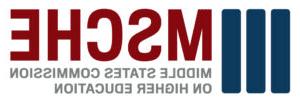October 2023 – January 2024
The Self-Study Leads group, several members of the Senior Leadership Team, and select Working Group Leaders complete the MSCHE Self-Study Institute (SSI) Self-Study Leads team begins meeting on a bi-weekly basis Develop Self-Study timeline & design Select members of the Self-Study Steering Committee Select members for the seven Working Groups…
Read More

 Middle States Commission on Higher Education (MSCHE), recognized by the United States Department of Education (USDE), serves as an independent authority in the realm of higher education.
Middle States Commission on Higher Education (MSCHE), recognized by the United States Department of Education (USDE), serves as an independent authority in the realm of higher education.